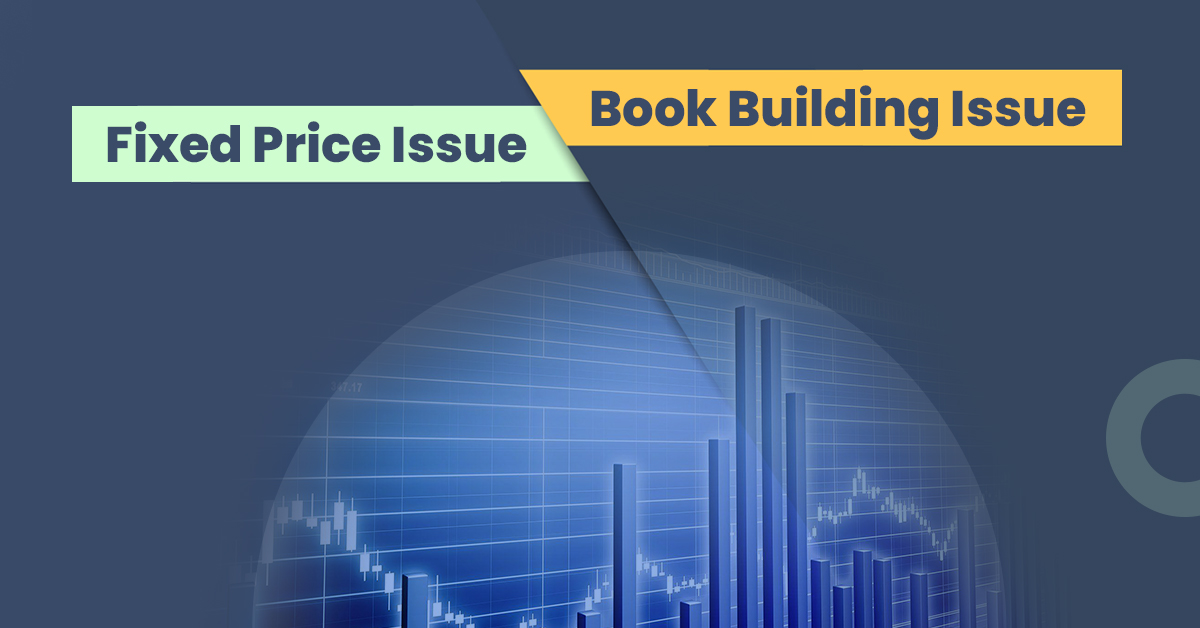Fixed Price Issue vs Book Building Issue: What Are Their Differences? 


Growth-driven companies raise capital from the primary markets through a process called initial public offering (IPO). It is when companies sell their shares to the public for the first time in the primary market. It is a win-win situation wherein companies get funds to fuel their operations and investors have an opportunity to grow their wealth.
Companies can make their initial offer either through a fixed price issue or a book building issue, or a combination of these methods. Let’s understand the details of the different types of IPO issues in this blog.
What Is a Fixed Price Issue?
When a company chooses this method for its IPO, it chooses a fixed price at which investors can buy its shares.
Before deciding to go public, the company evaluates its assets, liabilities, and other financial aspects, with its underwriters. Generally, companies hire investment bankers to assess and reduce risk levels.
These bankers calculate the company’s current value and evaluate its prospects. They are also responsible for finding out the overall risks of investments and evaluating how the company would compensate its investors in the presence of such high risks.
After such extensive research, underwriters set the price of a share to raise substantial capital for the company. In the fixed price issue method, investors are well aware of the price of shares that a company has decided even before it goes public.
What Is a Book Building Issue?
Though this concept is relatively new in India, it has become commonplace. Here, investors get to know the price of shares during the IPO process. In this process, the price is determined after bids are collected from investors during the period that the IPO stays open. It allows for more efficient price discovery.
Though the company does not set any fixed price, it sets two different prices which creates a price band. While the lower price is called the “floor price,” the higher price is called the “cap price.” The maximum difference between the “floor price” and “cap price” can be 20%. The offer document has a price band printed on it. Investors who wish to buy shares can bid for their preferred quantity within the price band before the issuer company sets a final price.
After considering various bids, the issue price is determined.
As per guidelines from the Securities and Exchange Board of India (SEBI), companies can issue securities to the public via a complete book building process or 75% of the IPO via the book building process.
Differences between Fixed Price Issues and Book Building Issues
Given below is a tabular representation of the differences between a fixed price issue and a book building issue:
| Parameters | Fixed price issue | Book building issue |
| Meaning | The prospectus mentions the issue price of shares and people need to buy shares at that price only. | A bidding process determines an IPO’s price. Investors receive a price band and have to bid at a price within this band. It is the way most companies arrive at the price at which they sell their shares. |
| Price of shares | The price of shares is known well in advance and the prospectus mentions it as well. | The minimum and maximum price at which a company wishes to sell its shares is known well in advance but the exact issue price of the shares is not known. |
| Determination of demand | A company becomes aware of public demand for its shares after the fixed price issue. | A company comes to know about the public demand for its shares daily. Every day, bids are registered in the book until the closure of an issue. |
| Prospectus | A company is required to issue a prospectus containing details of the price at which shares are offered along with the total number of shares that this company is offering. | A Red Herring Prospectus is issued by the company which contains the total size of an issue along with its price band. |
| Payment of application money | Investors have to pay in advance the purchase price for applied lots while submitting the application for shares. | Investors’ amounts will be blocked in the bank account for the amount applied. The final amount will be collected once the issue price has been determined. |
| Reservations | 50% of shares offered by a company are reserved for applications below ₹2 lakh and the rest of the allocations are reserved for higher amount applications. | 50% of shares are reserved for Qualified Institutional Buyers (QIBs), 35% for non-retail investors and the rest for retail investors. |
| When is it used | Fixed price issue method is used for any issue, i.e. IPOs, Rights Issues, Public Issues, ESOS, etc. | Book building issue is used primarily for Public Issues, i.e. IPO and FPO. |
Final Word
In the case of fixed price issues, the IPO price is fixed. For book building issues the price is discovered during the IPO period. Moreover, capital raised from book building issues can be much more than funds raised by fixed price issues. Gradually, the book building issue is becoming popular in the Indian stock market.
Frequently Asked Questions
What is the responsibility of lead managers in an IPO?
Companies appoint lead managers who are responsible for managing the entire IPO process. IPO lead managers are independent financial institutions registered with the Securities Exchange Board of India (SEBI). Their responsibilities include initiation of IPO processing, getting approval from the SEBI for offer documents, and creating Draft Red Herring Prospectus (DRHP).
What is a ‘follow-on public offering’?
When a publicly listed company issues new shares to the public, it is known as a follow-on public offering (FPO). In other words, when a company that has already completed the IPO process offers additional shares, it is known as a “follow-on public offering.”
How is book building better than a fixed price mechanism?
Before book building issues were introduced, IPOs were either overpriced or underpriced. It was quite a problematic process because under-priced shares led to less capital for the companies and on the other hand investors did not fully subscribe to overpriced shares. The book building process made the entire process more flexible and increased efficiency in the primary market.
What is a price band?
A price band enables investors to bid. There are two components to a price band: a floor price for the minimum bid amount and a cap price for the maximum bid amount, which has a maximum range of 20%







